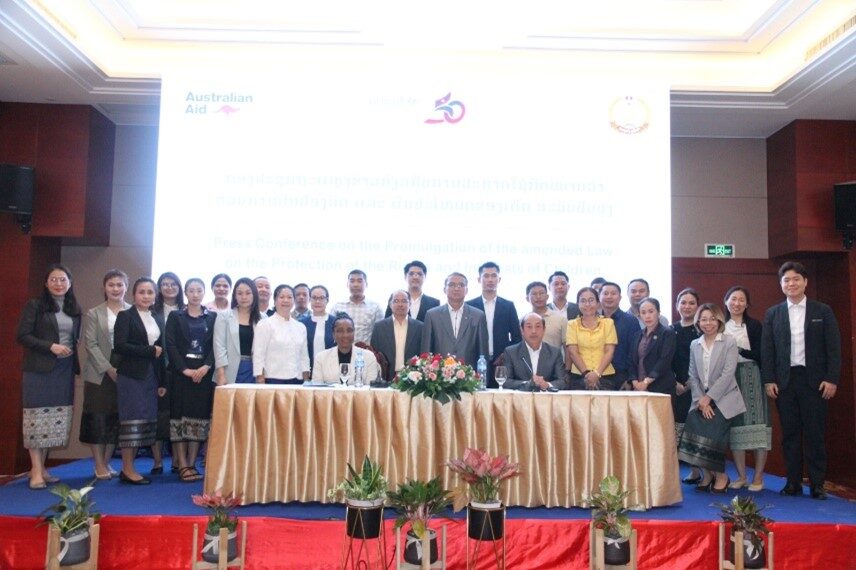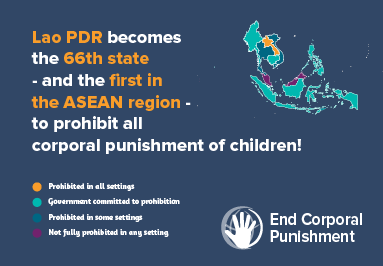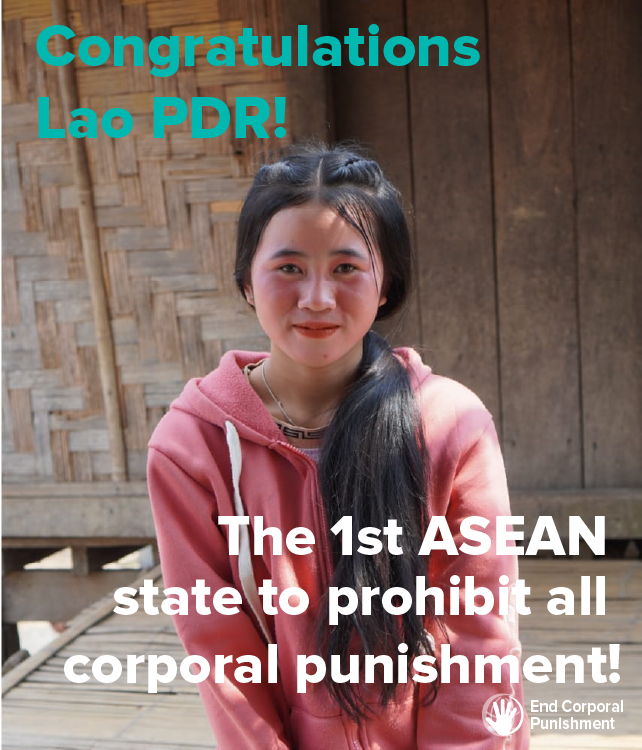Landmark progress for children in the ASEAN region: How Lao PDR prohibited all corporal punishment, and what it is doing to put the law into practice
By enacting the Law on the Protection of the Rights and Interests of Children 2006 (Amended) Lao PDR became the 66th state worldwide to prohibit all corporal punishment of children in all settings, and the first state in the ASEAN region to achieve this fundamental reform for children, putting into law children’s right to protection from all violent punishment.
Read our announcement of Lao PDR’s law reform.
This article explains more about how Lao PDR came to reform its laws, and what it is doing to put the law into effect, thereby make significant progress towards ending all violence against children.
Origin of campaigning and advocacy in Lao PDR
20 years of efforts: from grassroots activities to national change
For the past 20 years, the government of Lao PDR and its development partners- including UNICEF and Save the Children- have worked in close collaboration to strengthen children’s rights and prohibit all corporal punishment of children in all settings.
Save the Children started advocating for the prohibition of all corporal punishment of children in Lao PDR in 2004 under their strategy to address all forms of physical and psychological punishment of children in the Southeast Asia and Pacific Region.
Since 2005, UNICEF has been closely working with the Laos justice sector, including the Ministry of Justice and other key legal institutions. For instance, UNICEF conducted nationwide trainings for local authorities on child rights education and justice, child protection issues including violence against children. In 2007 a study conducted by Save the Children in partnership with the Ministry of Justice of Lao PDR in Vientiane and Bolikamsai revealed that children in various sample groups shared similar experiences of violence.

The amendment of the Law on the Protection of the Rights and Interests of Children is one of the concrete actions taken by the Government of Lao PDR to implement the UN Committee on the Rights of the Child’s concluding observations in 2018 and the National Plan of Action for Child Protection System Strengthening (2022 – 2026).
The amended law further represents the government's priority in strengthening the child protection systems and developing the social service workforce while enhancing the accountability of law enforcement.
H.E. Mr. Kongchi YANGCHUE, Vice Minister of Justice, 5 December 2023
The Government of Lao PDR led the implementation of the Violence Against Children and Youth Survey (VACS) in 2014, and launched the VACS report in 2018. The Lao VACS was led by the Ministry of Planning and Investment, with technical assistance from the Centers for Disease Control and Prevention (CDC), as part of the Together for Girls partnership, and support from UNICEF Lao and Australian Department of Foreign Affairs and Trade. In 2018, the Government of Lao PDR launched a multi-sectoral response to the VACS.
In 2018 Lao PDR was the only Asian government to attend the High Level Global Conference on the Universal Prohibition of Corporal Punishment held in Malta. The conference provided an opportunity for participating UN Member States, international organisations and civil society representatives to come together and reinforce the commitment made in the Sustainable Development Goals Target 16.2 to end all violence against children.
More recently, at community level, the Association for Community Development and Terre des hommes Germany ran a three-year project from 2020-2023 called 'Love Does Not Hurt'. The project used cultural and creative strategies including community theatre to encourage the abandonment of corporal punishment and adoption of positive discipline approaches in raising children.
National plans to end and respond to violence against children identify the need for law reform on corporal punishment
In 2019 an assessment of the Lao PDR child protection system found that legislation needed to be revised to support the strengthening of the system, among other measures. Following this assessment, UNICEF supported the Government in a multi-sectoral process to identify the long-term vision for the child protection system. This vision informed the National Plan of Action for Child Protection System Strengthening 2022 – 2026. The Plan confirmed the need to review the laws related to child protection and made a recommendation to fully prohibit all corporal punishment of children.
The Lao PDR Second Five-year National Plan of Action for Prevention and Elimination of Violence Against Children 2021 – 2025 - which was influenced by the ASEAN Regional Plan of Action on the Elimination of Violence Against Children - also included plans to review existing legislation and policies, and update policies to improve systems, capacity, and skills to prevent and respond to violence across the education system, and to conduct publicity campaigns on relevant laws and policies.
The passage of the law
The process of amending the Law on Protection of the Rights and Interest of Children began in 2022. The Ministry of Justice established a supervisory committee led by the Vice Minister of Justice, H.E Kongchi Yangchue and a technical team for revising the amendment.
The technical team received training on child participation and developed the methodology and tools for consultations with children. A series of consultations and interviews were carried out with diverse groups of children and youth in six Provinces and the City. Consultation meetings were also held with local authorities, government representatives, representatives from mass organizations, and community members, including parents.
The draft law was then reviewed by line ministries, National Assembly members, development partners, UNICEF regional experts and finally submitted to the National Assembly for its approval in July 2023.
The President of Lao PDR, H.E. Mr. Thongloun Sisoulith, signed the Decree on the Promulgation of the amended Law on the Protection of the Rights and Interests of Children on 30 August 2023, and the law became effective on 4 December 2023, marking a major milestone for child rights in the country.
Lao PDR becomes the first ASEAN country to enact full prohibition of corporal punishment!
The ASEAN Regional Plan of Action for the Elimination of Violence Against Children 2016-2025 includes Action 3.22 which commits countries to enacting prohibition of corporal punishment of children in all settings of their lives. Lao PDR is the first country in the ASEAN region to achieve this goal.
The mid-term review of the Regional Plan of Action carried out in 2019 highlighted the slow progress across the region in the review and revision of laws related to ending violence against children, including in Laos. This was taken into consideration in the development of Laos’ Second Five-year National Plan of Action for Prevention and Elimination of Violence Against Children 2021 – 2025, which included commitments to review legislation.

Putting the law into practice
- Communicating and raising awareness of the new law and prohibition of corporal punishment
A plan for the dissemination and implementation of the Law on Protection of the Rights and Interests of Children is currently being developed by the Government and UNICEF. The plan will include community awareness raising, distribution of information, education and communication materials and dissemination of key messages through TikTok and other social media channels. A brochure providing information about the new law, including the prohibition of corporal punishment, will be produced by the Ministry of Justice, and distributed to education, justice and childcare institutions.
- Supporting positive parenting
UNICEF Lao is delivering the parenting programme ‘Love and Care for Every Child’ across six Provinces, in partnership with the Government. The programme aims to support rather than instruct parents, exploring the most important elements of parenting under three pillars: Care, Protection, and Communication. Positive discipline and prevention of violence are addressed under the Protection component.
- Monitoring the impact of the law
The implementation of the law will be jointly monitored by UNICEF and the Government, in particular the Juvenile Justice Coordination Committee and its Secretariate, which comprise the Ministry of Justice, Ministry of Public Security, People’s Supreme Prosecutor, People’s Supreme Court and the Ministry of Labour and Social Welfare (MOLSW).
- Strengthening professional capacity to put the new law into practice
There will be a comprehensive programme to build the capacity of professionals to put the new law into effect. The MOLSW is leading the implementation of the National Strategy for Social Service Workforce Development for both professional and para-social workers across sectors, including those from Education, Health and Justice. UNICEF will support capacity building of law enforcement officials, including court staff, prosecutors, police, and those involved in the child protection service.
- National strategy to end violence against children
The enactment of prohibition of corporal punishment is part of a range of measures in the Plan of Action for the Prevention and Elimination of Violence against Children (2021-2025). The Plan consists of four main goals and priority actions:
- Enhancing the multi-sectoral coordination and monitoring to end violence against children in all settings.
- Preventing and responding to online violence, including child online sexual exploitation and abuse
- Preventing and responding to violence in schools, including corporal punishment
- Preventing and responding to violence in homes and communities, including corporal punishment
Find out more:
- Read more about the Law on Protection of the Rights and Interests of Children: Amended Law Marks Breakthrough for Stronger Protection of Children’s Rights in Lao PDR (unicef.org)
- Read our country report on Lao PDR
- Find out more about progress to end corporal punishment in the ASEAN and Asia Pacific regions
This legislation represents a profound advancement in the protection of child rights in Lao PDR, culminating from years of dedicated efforts by UNICEF, the government, and our partners. It stands as a testament to our unwavering commitment to eradicating all forms of violence against children, including corporal punishment, which is a significant violation of a child's basic rights. This achievement underscores the collective resolve and persistent work to safeguard the well-being of every child.
Dr. Pia Rebello Britto, UNICEF Representative to Lao PDR
The prohibition of all corporal punishment of children in all settings by the Government of Lao PDR is a major accomplishment. Lao PDR is the first ASEAN member state to reach such critical milestone towards protecting children from all forms of violence.Save the Children International in Laos will continue to support the Government to effectively implement the law, promote non-violent parenting and protect the rights and interests of children.
Luke Ebbs, Country Director of Save the Children International in Laos

